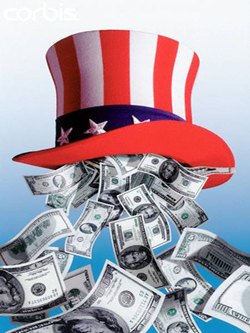Editorial: What's A Bailout to Do?

General Motors is on a crash course towards bankruptcy. The company once known as the world’s largest automaker is burning cash so rapidly most experts agree that it won’t last through next year. Although Ford has more money at hand, having mortgaged everything up to and including its logo, the Blue Oval is also spending its way towards C11. Chrysler? DOA. In response, Congress recently approved massive loan guarantees for the industry. But Motown’s supporters are clamoring for another, equally massive handout. As our duly elected representatives argue how best to save Detroit, its champions warn of looming disaster. Still it must be asked: should The Shrinking Three be left to face market forces unaided by Uncle Sugar?
The D2.8 are huge, their supporters say. The domestic automakers supposedly account for six outside jobs– dealers, suppliers, service station attendants, and hosts of others– for every job within. In a worst-case scenario, two million jobs could disappear, says David Cole, head of the Center for Automotive Research in Ann Arbor. Through unemployment and/or Medicaid, those workers would quickly soak-up tax money, Cole claims.
“Because of the fragile state of suppliers, a dying GM or a Ford would take key suppliers with it,” says Cole. That would bollix the supply chain for the transplants. But Cole says that a mere $10b worth of prevention could be worth $100b of cure– his estimate for the costs of bailout and cleaning up the mess, should the companies be allowed to fail, respectively. (This is a downsized estimate; Cole’s Center’s “catastrophe studies”predicted a $200 – $300b hit to the economy from an automaker’s failure, equivalent to 2 percent of GNP.)
An odd consequence of failure to bail might be to hamper environmental protection, says Greg Nowell, a political science professor at SUNY Albany. Since the early 1980s, when the US gave the Japanese an offer they couldn’t refuse (“voluntary” import quotas), the Japanese manufacturers have always more than met US environmental standards. They’ve “let Detroit do the foot-dragging” in the political arena, says Nowell. With Detroit gone, however, they might resist tighter regulations by threatening to take their marbles and go home. “In terms of environmental regulations, [the demise of the US industry] would be a game-changer,” says Nowell.
Nonetheless, neither Nowell nor three other experts interviewed by TTAC favor bailout. “Cole assumes that [following bailout] they will start getting a positive cash flow, which is not a foregone conclusion,” says David Dapice, an economist at Harvard and Tufts Universities. “It’s one thing to have a cash transfusion so you can keep operating at a loss, and another to have a game plan for profitability.”
Cole insists US cars are improving. “My wife has the new Saturn Outlook,” he says. “The execution has improved dramatically.” But the December issue of Consumer Reports recommends against the Outlook, and says GM is a “mixed bag,” while “Ford’s reliability is now on par with good Japanese automakers.”
Dapice suggests that socializing health care costs might be a better approach than helping the auto companies directly. This would eliminate the transplants’ advantage of having younger workers with lower health care costs, and far fewer pensioners. According to the Detroit consulting firm Harbour-Felax, for each car it manufactures, GM spends $1,635 on health care for both current and retired American workers. For Toyota, the comparative figure is just $215.
Socializing health care costs would also have the advantage of avoiding picking winners, or in this case, losers. “I don’t think the US does well with industrial policy since it’s so political,” says Dapice. And “If you want a stimulus package, it might make sense to give money to [the city of] Detroit, or the state, so they can keep their bridges from collapsing. But I don’t think it makes sense to just pump money into failing companies.”
Regarding Cole’s warnings about key suppliers going under, Chris Knittle, a professor of economics at UC Davis isn’t worried. He says that if GM goes out of business, other manufacturers will pick up the slack.
If past is prescient, the demise of the shrinking three would brook no loss to automotive innovation, says Knittle, Volt notwithstanding (its projected price, 40 Gs, insures scant market penetration). The U.S. industry has not exactly been on the cutting edge for at least the last half century.
“What is fundamentally wrong with the US automobile industry?” Nobel economist Robert Solow asks rhetorically. “Why has it been unable to compete adequately, even with American plants owned by Japanese, European, and Korean automakers?”
“[American automakers] have a lot of corporate inertia,” says Knittle. And “when they can always fall back on the government to bail them, there’s even less incentive to change.” Noting that the market culls the unfit, breaking ground for new companies, he says that through bailouts, “You are taking out one of the mechanisms in which a market economy improves productivity.”

I'm a freelance journalist covering science, medicine, and automobiles.
More by David C. Holzman
Latest Car Reviews
Read moreLatest Product Reviews
Read moreRecent Comments
- Theflyersfan I wonder how many people recalled these after watching EuroCrash. There's someone one street over that has a similar yellow one of these, and you can tell he loves that car. It was just a tough sell - too expensive, way too heavy, zero passenger space, limited cargo bed, but for a chunk of the population, looked awesome. This was always meant to be a one and done car. Hopefully some are still running 20 years from now so we have a "remember when?" moment with them.
- Lorenzo A friend bought one of these new. Six months later he traded it in for a Chrysler PT Cruiser. He already had a 1998 Corvette, so I thought he just wanted more passenger space. It turned out someone broke into the SSR and stole $1500 of tools, without even breaking the lock. He figured nobody breaks into a PT Cruiser, but he had a custom trunk lock installed.
- Jeff Not bad just oil changes and tire rotations. Most of the recalls on my Maverick have been fixed with programming. Did have to buy 1 new tire for my Maverick got a nail in the sidewall.
- Carson D Some of my friends used to drive Tacomas. They bought them new about fifteen years ago, and they kept them for at least a decade. While it is true that they replaced their Tacomas with full-sized pickups that cost a fair amount of money, I don't think they'd have been Tacoma buyers in 2008 if a well-equipped 4x4 Tacoma cost the equivalent of $65K today. Call it a theory.
- Eliyahu A fine sedan made even nicer with the turbo. Honda could take a lesson in seat comfort.


































Comments
Join the conversation
Geeber - I doubt we are talking to anyone but each other at this point. I am saying, you can't suck 5T out of the economy without a negative economic impact. Just doubling interest on the national debt from 250B per year to$500B per year is a huge economic drag. Yes they were hung for pre-emptive war. Now, think of signing statements - now that Bush has made this popular, just imagine a Democratic President removing any Republican backed parts of bills. Remember in 2005 Frist wanted to remove the filibuster, which was kept only if the Democrat agreed not to do it. No, we do not need support from Republicans to support our agenda. Many may sign up, but Republicans are not driving the car. You get another chance in four years. Our machine tools are leveraged from automotive suppliers, our composite materials, our electronics components, and so much more. From a national security standpoint, there is a difference between US companies, and foreign companies with US plants. It is the entire supply chain, not just the big 3. You may not like the bailout, but I never liked the Iraq war. None of us can get all we want. Best regards (many of my friends and relatives feel the same way you do).